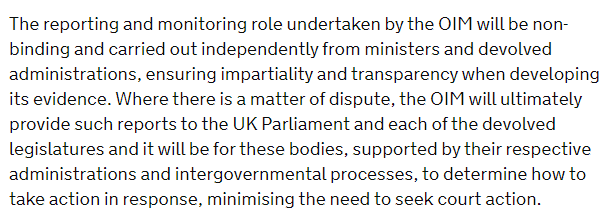Today is the day the UK Internal Market Bill is published. The bill will have *big* implications for the constitution, devolution, public spending, and the UK's international obligations (just a few issues then). Here are the top 5 things to look out for:
1) Mutual recognition - the bill will this principle - which will ensure that anything that is acceptable on the market in one part of the UK will be acceptable in the other (more complicated in NI) - in law.
The UK gov says this will simply replace the principle that already exists in EU law. The Scottish and Welsh govs argue it is an unacceptable constraint on their devolved powers & will allow English goods to undermine devolved standards & policies.
Watch out for any exemptions in the application of the principle, the EU allows some prohibitions if there is "legitimate public interest ground". The white paper suggests the UK provision will be more blanket - but this may change in the legislation.
2) Governance - there are big questions about how these principles will be enforced. The UK gov's press release suggests the newly established OIM will take a view on any possible breaches, but the four government will be left to sort out any disputes through IGR mechanisms.
As we know existing IGR mechanisms are widely considered not fit for purpose, and a review into them has been ongoing since March 2018. There are hopes that an agreement, including a new dispute resolution mechanisms, is imminent so another one to watch out for.
3) The 'limited and specific breach' of the NI protocol - as I set out yesterday it is expected that the bill will contain powers to allow ministers to take unilateral decisions adding their own interpretation to elements of the protocol. https://twitter.com/Jess_Sargeant/status/1303307585978859520?s=20
Reports suggest the 'at risk' criteria might now be in the Finance Bill but for the others, the devil will be in the detail.
4) The Shared Prosperity fund - the UKG has said that it will take new powers to spend money previously allocated by the EU. The DAs have long been concerned that the UK gov will use the scheme to bypass the DAs & spend directly in devolved areas
It looks like they might be right... The UK government has been promising to publish a consultation on the SPF since 2018, but so far we haven't seen anything. The Welsh government will be particularly concerned by this move. More here: https://www.instituteforgovernment.org.uk/explainers/european-structural-funds-after-brexit
5) Legislative consent - As the bill will affect devolved competencies, under the Sewel Convention the devolved legislatures will vote on whether to give consent to the bill. https://www.instituteforgovernment.org.uk/explainers/sewel-convention
The Scottish Government have already said consent is 'impossible', for the Welsh there may still be hope but the shared prosperity fund may be the final nail in the coffin. And in Northern Ireland, this decision is likely to put huge strain on the Executive.
The UK government has previously shown a willingness to press ahead without consent - as it did for the EU Withdrawal Agreement Act to which all 3 devolved legislatures objected. But doing so could play into constitutional debates about the future of the Union.
With the usual caveat of we don't know until we see it, it looks like there is a lot in this bill, and will far-reaching implications. It's worth remembering that the White Paper was only published in July the UK gov intends to pass this bill before the end of December.
There is a real question of whether that is enough time to ensure proper and thorough scrutiny.
Ends.
Ends.

 Read on Twitter
Read on Twitter


